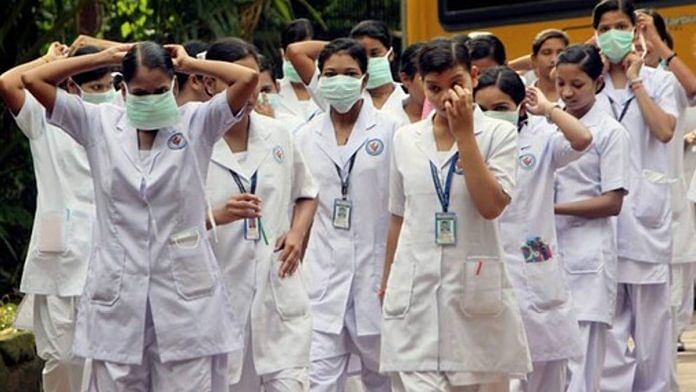New Delhi: The Union health ministry has decided to reduce the qualifying percentile for leftover postgraduate (PG) seats in medical colleges to zero — a move that the Indian Medical Association (IMA) has hailed but others in the medical profession have characterised as bizarre.
In other words, this means that all candidates who appeared for the National Eligibility-cum-Entrance Test (PG), 2023, are now eligible for admission to seats that may still be available in MD/MS courses following two rounds of counselling, as there are no minimum qualifying marks.
An order in this regard was issued Wednesday, a copy of which is with ThePrint.
“I am directed to refer to the above mentioned subject and to say that the recommendation for reduction in qualifying percentile for Post Graduate Courses for 2023 (NEET-PG 2023) has been considered in the ministry,” said the letter signed by an under-secretary in the health ministry and sent to the secretary of the National Medical Commission (NMC).
“Approval of competent authority is hereby conveyed for reduction of qualifying percentile for NEET-PG 2023 to Zero across all categories,” it added.
The letter was also sent to the National Board of Examinations (NBE), which conducts NEET PG, as well as to the medical counselling division of the ministry and the principal secretaries (health) of all states.
In response to the order, the IMA — the largest network of doctors in India — issued a statement thanking the health minister and saying it had requested the government to do this. It said that due to the “high percentile for admission”, many “deserving students” had been unable to join PG courses even when seats were vacant.
Before this, the cut-off percentile for admission to PG seats during the first two rounds of counselling had been 50 for the unreserved category, 45 for the PwD (persons with disabilities) category and 40 for reserved-category students.
A senior official in the health ministry told ThePrint that the move was aimed at filling stray PG seats in medical colleges that have been going vacant year after year.
“Last year too, for the last round of counselling, the qualifying percentile was reduced to 30 but nearly 4,000 seats went vacant,” the official said.
“This has become a norm almost every year and, mostly, there are no takers for non-clinical or research subjects such as anatomy, biochemistry, physiology, microbiology and pharmacology while branches which promise good clinical practice later are quickly picked up by candidates,” he added.
According to the official, the government, through the move, aimed to fill PG seats in all streams in a bid to produce postgraduate doctors who would be interested in working as faculty for non-clinical subjects in medical colleges.
“It also needs to be noted that there is a merit list that has been prepared for NEET PG and the relaxation being given now is only to fill the leftover seats,” the official said.
Speaking about the order, Union health secretary Sudhansh Pant told ThePrint: “It’s very logical and can ensure that precious PG seats in lesser-sought-after disciplines do not remain vacant, which is a big national loss otherwise.”
There are about 47,000 MS/MD seats in the country across private and public medical institutions, and the government official said that the NBE will provide data on the seats left following the first two rounds of counselling post clearance of NEET, after which a fresh round of counselling will begin.
‘Beyond bizarre’
Several bodies such as the IMA and the Federation of Resident Doctors Association (FORDA) had been demanding a revision in the NEET PG cut-off criteria since last month.
But for many, the health ministry’s latest order has come as a shocker.
“If the PG seats do not get filled even by doing this (reducing qualifying percentile to zero), does it mean that the government will allow even those to take admission who may not have appeared for the test?” asked Dr K.V. Babu, a senior IMA member from Kerala.
Dr Satendra Singh, a senior faculty member at University College of Medical Sciences, University of Delhi, called the order “beyond bizarre”.
“This is an insult to those students who put in hours of learning and dedication (for the NEET exam). Consequently, it will lead to substandard patient care,” he warned.
Dr Singh added that the “government was on a spree to open medical colleges and raise undergraduate and PG seats without factoring in issues such as proper infrastructure and faculty”.
Dr Rohan Krishnan, chairman of the Federation of All India Medical Association, said the move would lead to further corruption in the medical education sector as “it would allow private medical colleges to sell PG seats to anybody willing to pay for them”.
“Steps like these defeat the purpose of having an examination such as NEET, which promises to put merit at the forefront,” he asserted.
But some doctors also said that the government’s order should be seen in the right context.
“While this cannot be a precedent for future admissions and should be seen only as a one-time measure, the students who have become eligible under the new criteria are not raising objections, emphasising that it remains their prerogative to decide whether to accept the seats they qualify for,” said Dr Aviral Mathur, president of FORDA.
“The concern about a potential dilution of healthcare quality is a valid one, but its effects may only manifest in the long run, and we cannot assume repeated decisions of this nature each year,” he added.
For instance, he pointed out, non-clinical seats at even one of the premier medical colleges in Delhi — Maulana Azad Medical College — were currently vacant.
“This situation begs the question of what might be happening in other parts of the country. How will it be possible, then, that only medical professionals should exclusively teach these (non-clinical) subjects,” he asked.
(Edited by Nida Fatima Siddiqui)
Also Read: Prescribe generics or face penalty? Govt asks NMC to modify controversial rule for doctors



